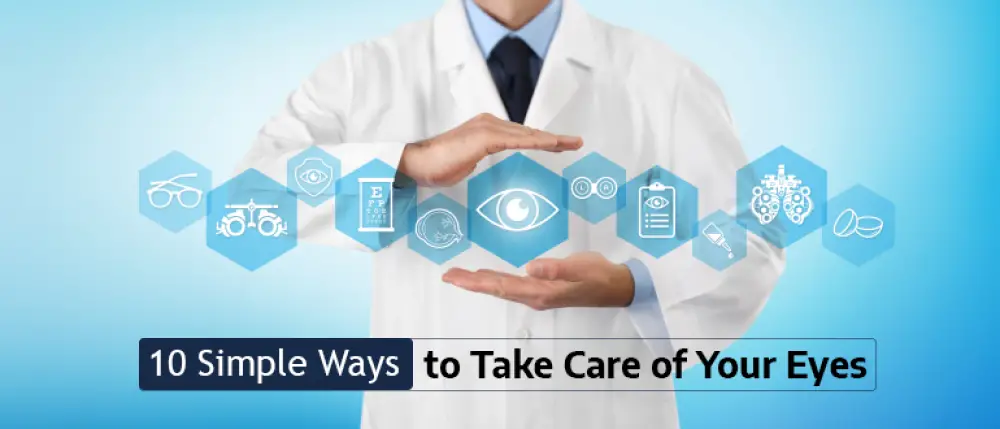Subscribe to get weekly insights
Always stay up to date with our newest articles sent direct to your inbox
Published on 4 Apr, 2023
Updated on 8 May, 2025
5535 Views
3 min Read

Written by Care Health Insurance
favorite1Like
Our eyes are the most crucial and delicate sensory organs that help us to experience this colourful world. The tremendous power of absorbing and instantly processing above 10 million pieces of information every second– makes the human eye the most peculiar body part. However, this quintessential body organ needs to be taken special care of. A healthy lifestyle and specific precautionary measures can prevent eyesight-related problems in life.
This article will discuss ten essential tips for maintaining healthy eyesight and keeping all vision-related problems at bay.
Here are the ten easy ways to care for your eyes and maintain healthy vision:
Taking a balanced diet is the first step towards maintaining healthy eyesight. You need to consume a wide variety of foods rich in vitamins and proteins for good eye health. Your regular diet should include assorted fruits and vegetables, especially deep yellow and green leafy veggies, all of which are rich in vitamin A – necessary for eyesight. Besides, you should consume fish rich in Omega 3 fatty acids, such as tuna, salmon, hilsa, and halibut, for bright eyesight.
Continuous exposure to the harmful rays of the sun as well as computer screens can severely damage your eyesight. Moreover, it may pose the risk of cataracts and age-related glaucoma. Hence, you must protect your eyes by using sunglasses outdoors and using blue-cut anti-glare glasses while working on a PC. Such protective eyewear blocks up to 100% of UV radiation.
Smoking increases the risk of developing age-related eye diseases such as macular degeneration and cataracts. Worse, smoking cigarettes and other intoxicants can damage the optic nerve. On the other hand, long-term alcohol consumption can cause eye diseases such as optic neuropathy or optic atrophy.
Eye specialists generally advise that all adults between 18 and 60 should get the Dilated Eye Exam every two years. In this exam, the ophthalmologist first assesses the vision by preliminary tests, asking you to read letters close up or far away. This helps in detecting nearsightedness or farsightedness.
Also, the doctor will put some eye drops into your eyes to dilate or widen your pupils. Just like opening a door lightens up a dark room, widening your pupil draws more light into your eyes. Thereafter, the eye specialist checks for common vision defects— glaucoma, diabetic retinopathy, and age-related macular degeneration (AMD).
Some people inherit specific vision-related problems from their family lineage. Hence, you must be aware of anyone in your family with any vision defect. This will help you take preventive measures to control the symptoms of a possible eyesight defect.
Many eye diseases are caused due to contamination when you touch your eyes with dirty hands. Hence, keeping your hands washed and sanitized is essential so they do not contaminate your eyes, even if you touch them unintentionally. Moreover, you must avoid touching and rubbing your eyes frequently.
We all know that water is an essential need of the body. Inside the human eye, i.e., behind the lens, is a medium called vitreous humour. As its name suggests, it is transparent and has 98% water, 2% sodium hyaluronate, and collagen fibres. Vitreous humour is the chief constituent part of the eyeball that needs to remain hydrated for the smooth functioning of the eye. Hence, you must drink plenty of water to prevent dryness in the eyes.
Here’s the 20-20-20 golden rule for healthy eyes:
Regularly practising these three steps will improve your eyesight and correct your posture, improving blood circulation. Ultimately, this will mitigate the risk of age-related vision defects.
Your eyes work day and night to see and sense the objects around you. They, too, need adequate rest to recharge. Hence, it is essential for you to get enough sleep. Make sure that you properly shut your eyes while you sleep. You may also wear a cosy and dark-coloured eye mask while sleeping.
While working on the PC, ensure that your monitor is placed about arm’s length away from your eyes and at an angle of 20 degrees below the eye level. This reduces the strain on your eyes while keeping the neck posture well-balanced.
Following the essential tips mentioned above can help maintain healthy vision and prevent vision defects throughout your life.
However, if you undergo corrective eye surgery or a treatment, you need not worry about the hefty expenses of such procedures. Our Super Mediclaim Plan will cover the specified expenses related to eye surgery.
>> Also Read: Need of Health Insurance For Cataract Surgery
Disclaimer: Please verify the policy details and coverage with the official policy documents. Also, consult a professional medical expert to ensure proper treatment for your health concerns.
Thyroid : मामूली नहीं हैं महिलाओं में थायराइड होना, जानें इसके लक्षण और घरेलू उपचार Vipul Tiwary in Diseases
शुगर कंट्रोल कैसे करे? जानें, डायबिटीज में क्या खाना चाहिए Vipul Tiwary in Health & Wellness
हाई ब्लड प्रेशर को तुरंत कंट्रोल कैसे करें? देखें इसके उपाय Vipul Tiwary in Diseases
पैरों में दर्द किस कमी से होता है? जानें, इसके घरेलू इलाज Vipul Tiwary in Health Insurance Articles
Hospital Costs Going Up Next Year? Medical Inflation Might Surprise You Jagriti Chakraborty in Money Saving Tips
Sustainability in Healthcare: What 2026 Will Look Like Jagriti Chakraborty in Health Insurance Articles
The Science of Oil Pulling: Dentist’s Perspective vs. Ayurvedic Tradition Mudit Handa in Home Remedies
7 Surprising Benefits of Matcha You Probably Never Knew! Jagriti Chakraborty in Health & Wellness
Always stay up to date with our newest articles sent direct to your inbox
Loading...